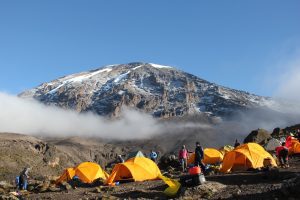The best Foods and Drinks for Acclimatizing to High Altitude.
Soaring through breathtaking mountain landscapes is an exhilarating experience, but the thin air at high altitudes can pose challenges for our bodies. Best foods and drinks for acclimatising to high altitude. Adjusting to reduced oxygen levels, known as adaptation, can be accompanied by headaches, fatigue, nausea, and even altitude sickness. But fear not, intrepid adventurer! The right food and drink choices can significantly ease your transition and fuel your exploration.
Hydration Hero: Water is Your Weapon
At high altitudes, your body loses fluids more rapidly due to increased respiration. Dehydration worsens height symptoms, so staying enough hydrated is paramount. Aim for 2-4 liters of water daily, even if you don’t feel thirsty. Consider adding electrolytes to your water with sports drinks or hydration tablets to replenish essential minerals lost through sweat.
1. Carb Champions: Fuel Your Engine
Carbohydrates are your body’s preferred energy source at high altitudes, requiring less oxygen to metabolize than fats or proteins. The best foods and drinks for adaptation to high altitude. Prioritize complex carbs like oats, quinoa, brown rice, sweet potatoes, and fruits for sustained energy release. Pack snacks like granola bars, dried fruits, and energy gels for quick refuels on the go.
2. Iron Warriors: Boost Your Oxygen Carriers
Iron is crucial for taking oxygen in your blood. Include iron-rich foods like lentils, spinach, beans, lean red meat, and dark chocolate in your diet to ensure efficient oxygen delivery to your cells.
3. Antioxidant Allies: Combat Free Radicals
The increased UV radiation and oxidative stress at high height can damage cells. Fight back with antioxidant-rich foods like berries, leafy greens, tomatoes, and garlic. These protect your cells and promote overall well-being.
4. Potassium Powerhouses: Balance Your Electrolytes
Potassium is vital for ensuring fluid balance and muscle function. Best foods and drinks for acclimatising to high altitude. Stock up on bananas, avocados, potatoes, and dried apricots to prevent electrolyte imbalances that can exacerbate altitude sickness symptoms.
5. Bonus Boosters: Natural Acclimatization Aids
Certain foods and alternative offer additional support for adaptation. Consider incorporating:
- Beetroot: Rich in nitrates that convert to nitric oxide, improving blood flow and oxygen delivery.
- Garlic and ginger: Possess anti-inflammatory properties that can alleviate altitude headaches and nausea.
- Maca root: A traditional Andean food believed to enhance energy levels and reduce altitude sickness symptoms.
- Acetazolamide (Diamox): A prescription medication that helps your body adapt to low oxygen levels, but consult your doctor before use.
6. Foods and Drinks to Avoid at High Altitude:
- Alcohol: Dehydrates and worsens altitude symptoms.
- Caffeine: Can induce anxiety and interfere with sleep at high altitudes.
- Heavy, fatty meals: Difficult to digest and can contribute to nausea.
- Salty foods: Increase thirst and exacerbate dehydration.
- Sugary drinks: Provide a quick energy boost but lead to a crash later.
Remember: Listen to your body, eat regularly, and adjust your food choices based on your individual needs and activity level. With the right fuel and a spirit of adventure, you’ll conquer those mountain peaks and create lifetime memories in the thin air!
FAQs: Best Foods and Drinks for Acclimatizing to High Altitude
A healthy and nutritious meal can help your body acclimate and function better in high altitudes. Potassium-rich foods such as bananas, greens, avocados, dried fruit, potatoes and tomatoes are great options.
What’s the most important drink for acclimatization?
Water reigns supreme! Aim for 2-4 liters daily. Electrolyte-enhanced water or hydration tablets can replenish essential minerals lost through sweat.
What carbs should I prioritize at high altitude
Complex carbs like oats, quinoa, brown rice, sweet potatoes, and fruits provide sustained energy without stressing your digestive system. Pack snacks like granola bars, dried fruits, and energy gels for quick refuels.
How can I boost my iron intake for efficient oxygen transport?
Lentils, spinach, beans, lean red meat, and even dark chocolate are iron champions. Include them in your meals to ensure efficient oxygen delivery to your cells.
Which foods help fight free radicals and cell damage?
Berries, leafy greens, tomatoes, and garlic are antioxidant powerhouses. Best foods and drinks for acclimatising to high depth. They protect your cells from the increased UV radiation and oxidative stress at high height.
What natural acclimatization aids can I consider?
Beetroot juice (rich in nitrates) promotes blood flow, garlic/ginger combat depth headaches, and maca root (traditional Andean food) may enhance energy and reduce symptoms. Consult your doctor before taking alternative one.
What should I avoid eating/drinking at high altitude?
Alcohol dehydrates and worsens symptoms, caffeine disrupts sleep, heavy/fatty meals are hard to digest, salty foods increase thirst, and sugary drinks cause energy crashes.
How often should I eat at high altitude?
Listen to your body and eat regularly, even if you don’t feel hungry. Small, frequent meals are easier to digest and maintain energy levels.
Can I still enjoy coffee or tea at high altitude?
Moderate consumption is okay, but prioritize water and limit caffeine before bedtime. Best foods and drinks for acclimatising to high altitude. Consider herbal teas for a soothing, hydrating alternative.
What if I have dietary restrictions?
Planning is key! Choose alternative sources of essential nutrients based on your specific needs. Consult a nutritionist for individual advice.
Is Caffeine Good or Bad for You at High Altitude?
Caffeine at high altitude can have mixed effects. It may boost energy and enhance physical performance, which is beneficial for activities like hiking. However, it can also dehydrate you, exacerbate altitude sickness symptoms, and disrupt sleep. Moderation is key—small amounts might help, but excessive consumption could worsen your experience. Hydrate well and listen to your body to balance the potential benefits and drawbacks of caffeine at high altitudes.
Where can I find more information on high-altitude nutrition?
Travel clinics, adventure travel companies, and well known online resources offer detailed guidance. Your doctor can also provide individual recommendations.
Remember, proper hydration, nutritious foods, and mindful choices can significantly ease your high-depth adaptation and empower you to explore new heights!







